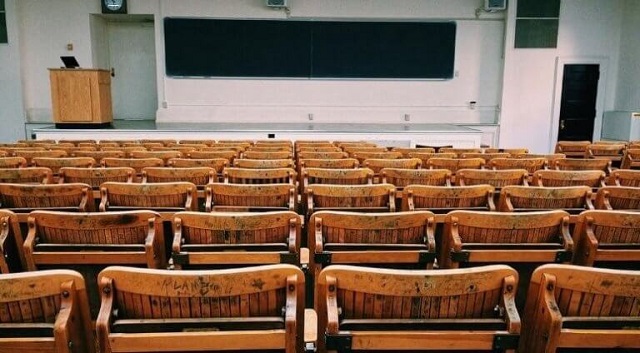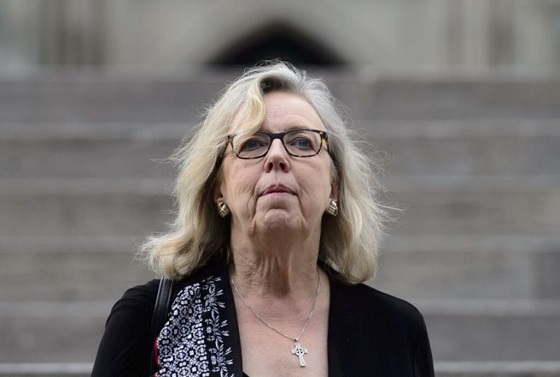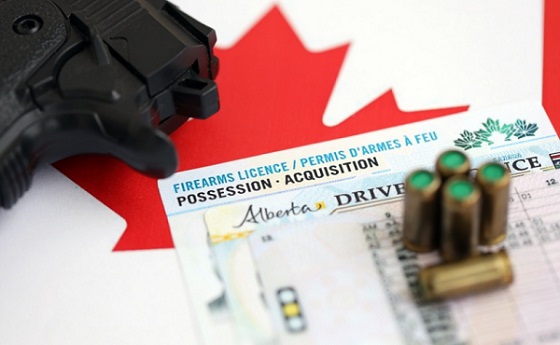Opinion
Don’t give campus censors more power — they’ll double down on woke agenda

From the MacDonald Laurier Institute
By Bruce Pardy
Expression on campus is already subject to the laws of the land, which prohibit assault, defamation, harassment, and more. The university has no need for a policy to adopt these laws and no power to avoid them.
Last Saturday, Liz Magill resigned as president of the University of Pennsylvania. Four days earlier she had testified before Congress about campus antisemitism. Does calling for the genocide of Jews violate Penn’s code of conduct? “It is a context-dependent decision,” Magill equivocated. Billionaire hedge fund manager Bill Ackman launched a campaign calling for Magill to step down, along with the presidents of Harvard and MIT, who testified alongside her. Their reluctance to condemn revealed a double standard. That double standard, like the titillation of a scandal, has distracted from the bigger mistake. Universities should not police the content of expression on their campuses.
In 2019, I invited a member of Penn’s law school to give a lecture at Queen’s University, where I teach. Some students at my law school launched a petition to prevent the talk. To their credit, administrators at Queen’s did not heed the call, even though the professor I invited, Amy Wax, had become a controversial academic figure. In 2017, she championed “bourgeois culture” in an opinion essay in the Philadelphia Inquirer (with Larry Alexander of the University of San Diego). The piece suggested that the breakdown of post-Second World War norms was producing social decay. Some cultures are less able than others, it argued, to prepare people to be productive citizens. Students and professors condemned the column as hate speech. It was racist, white supremacist, xenophobic and “heteropatriarchal,” they said.
Wax was not deterred. She continued to comment about laws and policies on social welfare, affirmative action, immigration, and race. When she was critical of Penn Law’s affirmative action program, the dean barred her from teaching first-year law students. In June 2023, he filed a disciplinary complaint against her, seeking to strip her of tenure and fire her. It accused Wax of “intentional and incessant racist, sexist, xenophobic and homophobic actions and statements.” The complaint alleged that she had violated the university’s non-discrimination policies and Principles of Responsible Conduct. But unlike others, allegedly, on Penn’s campus, Wax had not called for, nor was she accused of calling for, violence or genocide. She continues to wait for a decision in her case.
For years, North American universities have embraced certain political causes and blacklisted others. To stay out of trouble, choose carefully what you say. You can accuse men of toxic masculinity, but don’t declare that transgender women are men. You can say that black lives matter, but not that white lives matter too. Don’t suggest that men on average are better at some things and women at others, even if that is what the data says. Don’t attribute differential achievement between races to anything but racism, even if the evidence says otherwise. Don’t eschew the ideology of equity, diversity, and inclusion if you want funding for your research project. You can blame white people for anything. And if the context is right, maybe you can call for the genocide of Jews. Double standards on speech have become embedded in university culture.
Universities should not supervise speech. Expression on campus is already subject to the laws of the land, which prohibit assault, defamation, harassment, and more. The university has no need for a policy to adopt these laws and no power to avoid them. If during class I accuse two colleagues of cheating on their taxes, they can sue me for defamation. If I advocate genocide, the police can charge me under the Criminal Code.
In principle, universities should be empty shells. Professors and students have opinions, but universities should not. But instead, they have become political institutions. They disapprove of expression that conflicts with their social justice mission. Speech on campus is more restricted than in the town square.
The principle that universities should not supervise speech has a legitimate exception. Expression should be free but should not interfere with the rights of others to speak and to listen. On campus, rules that limit how, when, and where you may shout from the rooftops preserve the rights of your peers. Any student or professor can opine about the Ukrainian war, but not during math class. Protesters can disagree with visiting speakers but have no right to shout them down. Such rules do not regulate the content of speech, but its time and place. If you write a column in the student newspaper or argue your case in a debate, you interfere with no one. The university should have no interest in what you say.
Penn donors helped push Magill out the door. In the face of rising antisemitism, more donors and alumni in the U.S. and Canada are urging their alma maters to punish hateful expression. They have good intentions but are making a mistake. They want universities to use an even larger stick to censure speech. Having witnessed universities exercise their powers poorly, they seek to give them more. Universities will not use that larger stick in the way these alumni intend. Instead, in the long run, they will double down on their double standards. They are more likely to wield the stick against the next Amy Wax than against woke anti-Semites.
The way to defeat double standards on speech is to demand no standards at all. Less, not more, oversight from universities on speech is the answer. If a campus mob advocates genocide, call the police. The police, not the universities, enforce the laws of the land.
Bruce Pardy is executive director of Rights Probe and professor of law at Queen’s University.
Censorship Industrial Complex
Frances Widdowson’s Arrest Should Alarm Every Canadian

Speech Crimes on Campus
Frances Widdowson, a former colleague professor at Mount Royal University, was arrested this past week on the University of Victoria campus. Her offence? Walking, conversing, and asking questions on a university campus. She was not carrying a megaphone, making threats, organizing a protest, or waving foreign flags. She was planning quietly to discuss, with whoever wished it, a widespread claim that has curiously evaded forensic scrutiny in Canada for five years: that the remains of 215 Indigenous children lie beneath the grounds of the former Kamloops Residential School.
UVic Campus security did not treat her as a scholar. Nor even as a citizen. They treated her as a contaminating source.
The director of security, a woman more reminiscent of a diversity consultant than a peace officer, almost shaking, presented Widdowson with papers and told her to vacate “the property.” When Widdowson questioned the order, citing her Charter rights and the university’s public nature, she was told to leave. She refused, and she was arrested. No force, no defiance, only a refusal to concede that inquiry is trespass.
Widdowson is no provocateur in the modern sense. She is not a shock-jock in a cardigan. She is a once-tenured academic with a long record of challenging orthodoxies in Indigenous policy, identity politics, and campus culture.
In 2008, she co-authored Disrobing the Aboriginal Industry, a book that deconstructed the bureaucratic machinery that profits from preserving Indigenous dependency. The book was methodical, sourced, and daring enough to be labelled heretical in some quarters, but simultaneously boringly Marxist materialistic.
Her arguments have made people uncomfortable for a long time. When I assigned her book to my political science students in the Department of Policy Studies, where Frances also taught, I was summoned by the department head’s office. Someone in my class complained about the book, though I ignored what was said, and the technocratic colleague, as chair of the department, had prepared a host of arguments to chastise me for assigning the book.
Widdowson was good enough to be hired as a colleague of that department, but they were all afraid of her ideas, and perhaps her manner. I have often wondered if the folks in the Mount Royal hiring committee had bothered to read her book. Hey, they had a female Marxist applying for a teaching job. Knowing how they operate makes me think they made giant assumptions about Frances.
My bureaucratic colleague relented. I got the impression that the department head was putting on a show, going through motions he didn’t want to engage in, but which he had to perform for administrative purposes. He had to act on the complaint, though the complaint had no substance. He tried to tell me that the ideas in the book might offend some students, and then went on with the typical dribble about being caring, but agreed that protecting feelings was not the objective of an education, nor the job of a professor.
Haultain’s Substack is a reader-supported publication.
To receive new posts and support our work, please consider becoming a free or paid subscriber.
Try it out.
I went to my campus office after the conversation with the department head, typed up a memo detailing our discussion, and emailed it to him to ensure there was a record of my viewpoint. The email got no response. He never mentioned it again, and to this day, 15 or 16 years later, we still haven’t spoken about it.
Some academic arguments are meant to shake things up. That is the purpose of scholarship: to stir the sediment of consensus. To challenge conventional views. Marxist or no, scholars are supposed to push the envelope. Expand the boundaries of our understanding. But in today’s academic culture, discomfort is treated as injury and dissent as violence. So, Widdowson was treated as a threat merely by walking and speaking.
Was the university within its legal rights to remove her? Possibly. Universities can invoke property rights, ironically in Cowichan territory, and provincial legislation sometimes grants them a curious status: publicly funded yet selectively private. But the question is not merely legal. It is cultural and constitutional.
The University of Victoria is a publicly funded institution, governed under provincial authority and subsidized by taxpayers. Its grounds, though some claim they are on unceded Indigenous territory, are functionally administered by the Crown. The university is not a monastery. While it is not a temple to be kept free of doubt, it is not a temple to be torched either. It is a civic institution. An institution of higher learning. When it uses its resources to shield ideology and expel dissenters, it forfeits its academic character.
Consider the contrast. On this same campus, as on many others across the country, protests have called for the destruction of Israel and the extermination of Jews. Banners are waved, slogans chanted, and genocidal euphemisms like “from the river to the sea” are uttered without hesitation. These demonstrations, some of which praise Hamas or glorify martyrdom, proceed unimpeded. Security stands down. The administration issues boilerplate statements about inclusion and respect.
But when a female academic arrives to ask whether the number “215” refers to actual remains or mere radar anomalies, she is marched off by police. The imbalance is not accidental. It is a product of institutional capture.
Contemporary universities have adopted a new moral vocabulary. Terms like “safety,” “inclusion,” and “harm” are now treated as constitutional categories. But their terms are undefined, fluid, shaped by ideology rather than principle. “Safety” no longer refers to bodily security, but has become an emotional preference. “Inclusion” does not mean openness to different ideas and people, but a validation of specific identities. “Harm” is not an act, but a feeling.
Under this logic, Widdowson’s presence becomes a form of injury. Her questions are recast as wounds. And because feelings have been elevated to rights, her removal becomes a public good.
This ideology has structure. It is not random. It rests on a model of revolutionary politics in which dissent must not be part of the conversation. A differing opinion is an obstacle to be cleared. The new inclusivity has become a form of exclusion. It uses the language of welcome to police belief, and the rhetoric of tolerance to enforce conformity.
Charter rights were once the guardrails of public life. They are not supposed to vanish down the rabbit holes when one steps onto that university lawn. The right to free expression, to peaceful assembly, and to enter public space are not conditional on popularity. They are not subject to the feelings of a security director or the preferences of a DEI office.
Widdowson is testing this principle. She did not resist arrest, nor did she make a spectacle of herself. She acted as a citizen asserting a constitutional right. The courts may eventually rule on whether her rights were infringed. But the deeper issue is already visible.
If our public institutions can exile peaceful critics while accommodating radical political agitators who cheer for foreign terror movements, we are not in a neutral society. We are in an elite-managed consensus.
This consensus is enforced by policy. It does not need debate. The consensus managers already know what is true and treat challenges as threats. In this environment, universities are no longer places where young minds wrestle with the pangs of uncertainty. They are enforcing temples of doctrine. Their priests wear lanyards. Their rituals involve land acknowledgments. Their blasphemies include asking inconvenient questions about graves that no one has bothered to exhume.
Frances Widdowson may not be universally admired. No one is. Her conclusions are sharp. Her manner is uncompromising. But that is precisely why her treatment should alarm us. The test of a free society is not how it treats the agreeable, but how it tolerates the disagreeable, to paraphrase Bernard Crick.
When universities lose the confidence to host dissent, they cease to be universities in any meaningful sense. They become echo chambers with fancy libraries. They educate students in the same way a treadmill provides runners with travel: motion without movement.
We are at a moment of reckoning for universities and for Canadian liberal democracy. When citizens cannot openly raise questions without fear of removal, the Charter becomes ornamental. If the test of allowable speech is whether it affirms prevailing narrative and myths, then neither truth nor inquiry has a place among us.
Widdowson’s arrest is not an isolated event. It is a signal that tells us who is welcome in the public square and who is not. It tells us that the basic right to question popular opinions is now conditional. And it affirms for us what we already know: that the guardians of inclusion are, in practice, the agents of exclusion.
No democracy can afford such arbiters. Certainly not one that still calls itself liberal.
Haultain’s Substack is a reader-supported publication.
To receive new posts and support our work, please consider becoming a free or paid subscriber.
Try it out.
Energy
The Trickster Politics of the Tanker Ban are Hiding a Much Bigger Reckoning for B.C.

From Energy Now
By Stewart Muir
For years, a conservation NGO supported by major foreign foundations has taken on the guise of Indigenous governance authority on British Columbia’s north coast. Meanwhile, rights-holding First Nations with an economic agenda are reshaping the region, yet their equal weight is overlooked. A clash of values has resulted.
For more than a decade, British Columbians have been told — mostly by well-meaning journalists and various pressure groups — that an organization called Coastal First Nations speaks with authority for the entire coast. The name sounds official. It sounds governmental. It sounds like a coalition of Indigenous governments with jurisdiction over marine waters.
It isn’t any of those things.
Coastal First Nations (CFN) is a non-governmental organization, incorporated under the BC Societies Act as The Great Bear Initiative Society. It doesn’t hold Indigenous rights or title. It has no legislated role to provide benefits or services to First Nations members. It has no jurisdiction over shipping, marine safety, forestry, fisheries, energy development, or environmental regulation. Yet its statements are frequently treated as if they carry the weight of sovereign authority.
It’s time to say out loud what many leaders — municipal, Indigenous, and industry — already know: CFN is an advocacy group, not a government. Case in point, a recent news story with the following lede: “B.C.’s Coastal First Nations say they will use ‘every tool in their toolbox’ to keep oil tankers out of the northern coastal waters.” A spokesperson claimed to represent “the Rights and Title Holders of the Central and North Coast and Haida Gwaii,” yet notwithstanding the rights of any individual First Nation, CFN does not hold any formal authority.
Here’s why this matters. The truth is, Alberta has already struck its grand bargain with the rest of Canada. Now it’s time to confront the uncomfortable truth that the country is still one bargain short of a functioning national deal.
In 2026, with Canadians increasingly alert to who is shaping national conversations, there is a reasonable expectation that debates affecting our economic future should be led and conducted by Canadians — not by foreign foundations, not by out-of-country campaign strategists, and not by NGOs built to advance someone else’s policy objectives.
Where the confusion came from
CFN’s rise in public visibility traces back to the “Great Bear Rainforest” era, when U.S. philanthropic foundations poured large sums of money into environmental campaigns in British Columbia. A Senate of Canada committee document notes that the Gordon & Betty Moore Foundation alone provided approximately $25 million directly to Coastal First Nations, delivered as twenty-five nearly $1 million installments.
CFN also played a central role in the Great Bear Rainforest negotiations, which were financed by a coalition of foreign philanthropies including the Packard Foundation, Hewlett Foundation, Wilburforce Foundation, Rockefeller Brothers Fund, Nature Conservancy/Nature United, and Tides Canada Foundation. These foundations collectively contributed tens of millions of dollars to the “conservation financing” model that anchored CFN’s operating environment.
This history isn’t speculative. It’s well documented in foundation reports, Canadian Parliamentary evidence, and the publicly disclosed financial architecture behind the Great Bear Rainforest. For a generation, well-funded U.S. environmental campaigns have worked to make Canadians afraid of their own shadow by seeding doubt, stoking paralysis, and teaching a resource nation to second-guess the very wealth that built it.
Between 2010 and 2018, an independent forensic accounting review by Deloitte Forensic (backed by the Alberta government) found that foreign foundations provided roughly $788.1 million in grants for Canadian environmental initiatives. The largest single category — by a wide margin — was marine-based initiatives, totalling $297.2 million. In Deloitte’s categorization, “marine-based” overwhelmingly refers to coastal campaigns: Great Bear Rainforest–related advocacy, anti-tanker/shipping activism, marine-use regulation campaigns, marine ecological programs, and other coastal political work.

Land-based initiatives were the second-largest category ($191 million), followed by wildlife preservation ($173 million).
The forensic review also showed that of the $427.2 million that physically entered Canada, 82% — approximately $350.3 million — was spent in British Columbia, with the dominant share directed specifically toward coastal and marine initiatives.
Taken together, these findings confirm that foreign-funded environmental activity in Canada has been geographically concentrated in British Columbia and thematically concentrated on the coast – exactly the domain where CFN has been positioned as a public-facing authority.
The real authority lies with the nations themselves
If British Columbians want to understand who truly governs the coast, they should look to the Indigenous governments that hold rights, title, citizens, and accountability — not NGOs that comment from the sidelines. That means not overlooking:
- Haisla Nation, leaders of Cedar LNG
- Nisga’a Nation, co-developers of Ksi Lisims LNG
- Gitxaala Nation, asserting legal and territorial authority
- Kitselas and Kitsumkalum, both shaping regional development
These governments are also coastal First Nations. They negotiate major economic partnerships, steward lands and waters, and make decisions grounded in their own legal orders. Moreover, representation is the key measure of accountability in a democracy: First Nations governing councils are elected by their members. The CFN is not elected. The nations are accountable to their own people — not to U.S. philanthropies or to the strategic objectives of foreign-backed environmental campaigns.
The Haisla Nation once belonged to CFN, but quit in protest in 2012 when the body opposed LNG. The Haisla council went on to fully embrace economic development via liquefied natural gas and own the upcoming Cedar LNG project.
Meanwhile, the central and northern coastal regions where CFN has opposed numerous economic opportunities continue to suffer the worst child poverty in British Columbia.
In the delicate politics of the region’s First Nations alliances, relationships are constantly in motion and governed by inviolable traditions of mutual respect. From these threads, it has to be said that the CFN’s strategy of weaving the appearance of unanimity is truly a fabrication. In point of fact, CFN represents just one half of the story. My data source tells the story, by drawing together the latest available economic and demographic information for 216 British Columbia First Nations:
- Status Indian residents of CFN communities on the north coast number 5,484, with a total membership near and far of 20,447.
- The pro-development group noted earlier numbers 5,505 living local out of a total membership of 16,830.
In other words, virtually equal. Hence it’s obvious that any media report citing CFN as the singular authority for local First Nations interests is a misleading one. CFN speaks for only a slice of the North Coast, not the whole, and the numbers make that impossible to ignore.
When a CFN motion opposing responsible resource development was adopted by the Assembly of First Nations (see Dec. 2 news), it was further evidence that the deck is stacked against First Nations that are accountable and position themselves as having broad responsibilities, including but not limited to raising the standard of living of their members.
The future belongs to the nations
The politics of LNG on the North Coast can’t be grasped without staring directly at the tanker ban — not as scripture, but as the political curiosity it has become. Anyone who knows these waters understands it’s mostly theatre: it doesn’t question letting Alaska oil tanker ships transit our exclusive economic zone when we cannot, and it doesn’t touch the real risks coastal people actually worry about. Yet waving it away is naïve. The ban behaves like a trickster spirit in our public life — capricious, emotionally loaded, and capable of turning a routine policy debate into a cultural conflagration with barely a flick of its tail.
This is why Coastal First Nations retain such gravitational pull. For years, the ban has served as the moral architecture of their Great Bear Sea campaign. CFN represents a long-game strategy — build legitimacy, occupy the moral high ground, and shape the destiny of a nation by holding the symbolic centre. Their concerns seem genuine and rooted in lived stewardship – yet were shaped by Madison Avenue minds hired by American philanthropists to affect our politics. But a near equal number of coastal nation residents unified by a different outlook also have skin in the game. They are charting futures grounded in prosperity, environmental care, and sovereignty on their own terms, and their authority is the real thing — born of title, law, and accountability to their own people.
And here is the irony worth heeding: the tanker ban’s pageantry masks a solution. It is dragging into daylight a conversation the province has avoided for decades — a conversation that will soon prove inevitable as court rulings unsettle the very foundation of property rights in British Columbia. This is the hinge that the moment turns on.
Canada cannot resolve its growing national contradictions without moving its energy to global markets. Alberta has already made its grand bargain with the country. Now British Columbia must craft its own — harnessing the prosperity of energy development to discharge political debts and finally settle the title question that has defined the province’s modern era.
Stewart Muir
-

 National12 hours ago
National12 hours agoMedia bound to pay the price for selling their freedom to (selectively) offend
-

 Bruce Dowbiggin11 hours ago
Bruce Dowbiggin11 hours agoSometimes An Ingrate Nation Pt. 2: The Great One Makes His Choice
-

 COVID-192 days ago
COVID-192 days agoUniversity of Colorado will pay $10 million to staff, students for trying to force them to take COVID shots
-

 Business2 days ago
Business2 days agoOil tanker traffic surges but spills stay at zero after Trans Mountain Expansion
-

 Energy2 days ago
Energy2 days agoELZABETH MAY HAS IT WRONG: An Alberta to Prince Rupert Oil Pipeline Will Contribute to Greater Global Oil Tanker Safety
-

 Censorship Industrial Complex2 days ago
Censorship Industrial Complex2 days agoJustice Centre campaigning Canadian provinces to follow Alberta’s lead protecting professionals
-

 National2 days ago
National2 days agoAlberta will use provincial laws to stop Canadian gov’t from trying to confiscate legal firearms
-

 COVID-192 days ago
COVID-192 days agoCanadian legislator introduces bill to establish ‘Freedom Convoy Recognition Day’ as a holiday






